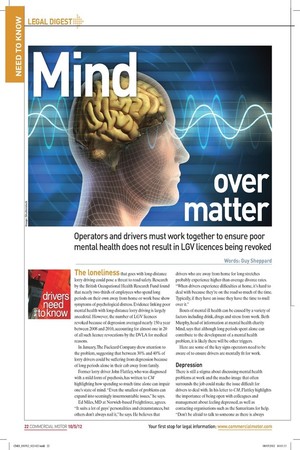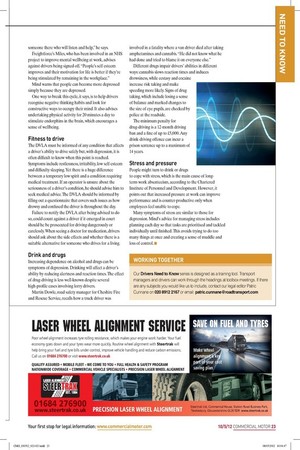n
Page 16

Page 17

If you've noticed an error in this article please click here to report it so we can fix it.
over matter
Operators and drivers must work together to ensure poor mental health does not result in LGV licences being revoked
Words: Guy Sheppard The loneliness that goes with long-distance lorry driving could pose a threat to road safety. Research by the British Occupational Health Research Fund found that nearly two-thirds of employees who spend long periods on their own away from home or work base show symptoms of psychological distress. Evidence linking poor mental health with long-distance lorry driving is largely anecdotal. However, the number of LGV licences revoked because of depression averaged nearly 150 a year between 2008 and 2010, accounting for almost one in 20 of all such licence revocations by the DVLA for medical reasons.
In January, The Fuelcard Company drew attention to the problem, suggesting that between 30% and 40% of lorry drivers could be suffering from depression because of long periods alone in their cab away from family.
Former lorry driver John Flattley, who was diagnosed with a mild form of psychosis, has written to CM highlighting how spending so much time alone can impair one’s state of mind. “Even the smallest of problems can expand into seemingly insurmountable issues,” he says.
Ed Miles, MD at Norwich-based Freightforce, agrees. “It suits a lot of guys’ personalities and circumstances, but others don’t always nail it,” he says. He believes that drivers who are away from home for long stretches probably experience higher-than-average divorce rates. “When drivers experience difficulties at home, it’s hard to deal with because they’re on the road so much of the time. Typically, if they have an issue they have the time to mull over it.” Bouts of mental ill health can be caused by a variety of factors including drink, drugs and stress from work. Beth Murphy, head of information at mental health charity Mind, says that although long periods spent alone can contribute to the development of a mental health problem, it is likely there will be other triggers.
Here are some of the key signs operators need to be aware of to ensure drivers are mentally fit for work.
Depression
There is still a stigma about discussing mental health problems at work and the macho image that often surrounds the job could make the issue difficult for drivers to deal with. In his letter to CM, Flattley highlights the importance of being open with colleagues and management about feeling depressed, as well as contacting organisations such as the Samaritans for help. “Don’t be afraid to talk to someone as there is always someone there who will listen and help,” he says.
Freightforce’s Miles, who has been involved in an NHS project to improve mental wellbeing at work, advises against drivers being signed off. “People’s self esteem improves and their motivation for life is better if they’re being stimulated by remaining in the workplace.” Mind warns that people can become more depressed simply because they are depressed.
One way to break this cycle, it says, is to help drivers recognise negative thinking habits and look for constructive ways to occupy their mind. It also advises undertaking physical activity for 20 minutes a day to stimulate endorphins in the brain, which encourages a sense of wellbeing.
Fitness to drive
The DVLA must be informed of any condition that affects a driver’s ability to drive safely but, with depression, it is often difficult to know when this point is reached. Symptoms include restlessness, irritability, low self-esteem and difficulty sleeping. Yet there is a huge difference between a temporary low spirit and a condition requiring medical treatment. If an operator is unsure about the seriousness of a driver’s condition, he should advise him to seek medical advice. The DVLA should be informed by filling out a questionnaire that covers such issues as how drowsy and confused the driver is throughout the day.
Failure to notify the DVLA after being advised to do so, could count against a driver if it emerged in court should he be prosecuted for driving dangerously or carelessly. When seeing a doctor for medication, drivers should ask about the side effects and whether there is a suitable alternative for someone who drives for a living.
Drink and drugs
Increasing dependence on alcohol and drugs can be symptoms of depression. Drinking will affect a driver’s ability by reducing alertness and reaction times. The effect of drug-driving is less well-known despite several high-profile cases involving lorry drivers.
Martin Dowle, road safety manager for Cheshire Fire and Rescue Service, recalls how a truck driver was involved in a fatality where a van driver died after taking amphetamines and cannabis. “He did not know what he had done and tried to blame it on everyone else.” Different drugs impair drivers’ abilities in different ways: cannabis slows reaction times and induces drowsiness, while ecstasy and cocaine increase risk taking and make speeding more likely. Signs of drug taking, which include losing a sense of balance and marked changes to the size of eye pupils, are checked by police at the roadside.
The minimum penalty for drug-driving is a 12-month driving ban and a fine of up to £5,000. Any drink-driving offence can incur a prison sentence up to a maximum of 14 years.
Stress and pressure
People might turn to drink or drugs to cope with stress, which is the main cause of longterm work absenteeism, according to the Chartered Institute of Personnel and Development. However, it points out that increased pressure at work can improve performance and is counter-productive only when employees feel unable to cope.
Many symptoms of stress are similar to those for depression. Mind’s advice for managing stress includes planning each day so that tasks are prioritised and tackled individually until finished. This avoids trying to do too many things at once and creating a sense of muddle and loss of control. ■












































